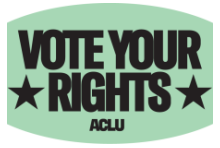Support the ACLU: Protect the Right to Vote
by ACLU Foundation (AMERICAN CIVIL LIBERTIES UNION FOUNDATION INC)Since the last presidential election, hundreds of bills have been introduced by politicians who are trying to make it harder for large segments of the population to vote, especially people of color, people with disabilities, and low-income individuals.
While the presidential elections come every four years in America, the ACLU works every day of every year to protect voting rights, block voter suppression efforts, and expand access to the ballot across the country.
Our mission is to build and defend an accessible, inclusive, and equitable democracy free from racial discrimination. Our work is guided by three principles: (1) all Americans should be eligible to vote; (2) voting should be free and easy; and (3) all people should count equally.
Here’s the latest (as of August 2024):
- Ohio victory for voters with disabilities: A recent law disallowed voters with disabilities from receiving help when casting an absentee ballot except from a very small handful of family members. Thanks to our lawsuit, potentially hundreds of thousands of Ohio voters with disabilities can now "select a person of their choice to assist them with voting," like grandchildren, caregivers, or neighbors, including with returning the absentee ballot.
- Relief for a Texas grandmother, Crystal Mason. The State of Texas prosecuted Crystal Mason for the crime of “illegal voting.” Ms. Mason cast a provisional ballot in the 2016 election while under federal supervised release, which Texas claimed made her ineligible to vote. Her ballot, which Ms. Mason cast on the suggestion of a poll worker, was never counted.
She was convicted in March 2018 and sentenced to serve five years in state prison. The ACLU and ACLU of Texas began representing Ms. Mason in 2019 in the appeal of her conviction. In a major win for voting rights, and after a nearly decade-long battle, Ms. Mason was acquitted. No one should face prison time for a mistake while trying to exercise their civic duty.
- The fight for fair maps continues nationwide. The U.S. Supreme Court in Alexander v. South Carolina NAACP reversed a South Carolina federal court’s unanimous finding that the state’s Congressional map was an unconstitutional gerrymander. The ACLU and partners challenged Congressional District 1 because it did not give Black voters a fair chance to elect their preferred candidates. Even though the 6-3 ruling was an injustice, we are continuing to challenge instances of racial gerrymandering and recently won a case in our challenge of Mississippi’s state legislative district maps.
- Preserving voting rights for Native Americans in Montana. The ACLU, with our Montana affiliate and partners, secured an important victory for Native American voters before the Montana Supreme Court in Western Native Voice v. Jacobsen. This case challenged two state laws: one ending Election Day registration, which allows voters to register and cast a ballot on Election Day, and another that prohibited absentee ballot collection by paid workers of voting rights and civic engagement organizations.
The Montana Supreme Court found that these laws unconstitutionally burdened the rights of Native American voters, who disproportionately rely on both Election Day registration and ballot assistance to vote. The Court noted that it’s “much more difficult on average for people living on reservations to either get to a polling place on or before election day, or to mail an absentee ballot prior to election day.”
We will continue to fight for Native American voters in Montana and across the country to preserve their fundamental, constitutional right to vote.
- Community-based organizations can get out the vote in Florida. After an April 2024 trial, we won our equal-protection challenge against Florida’s recent omnibus election bill, a part of which banned all noncitizens—regardless of lawful status—from “handling” or “collecting” voter registration applications on behalf of a third-party organization. We represented the Hispanic Federation, Poder Latinx, and three individual noncitizens who make their living working for similar organizations. In May, a federal district court in Tallahassee permanently blocked this unconstitutional law.
We'll continue pushing to expand voting access – countering voter suppression efforts in state legislatures across the country while advocating for federal voting rights legislation.
Thank you for your continued support.
